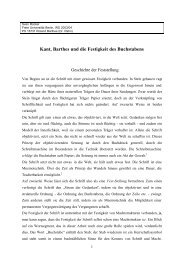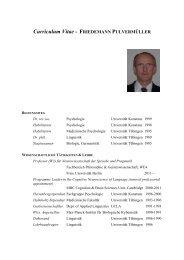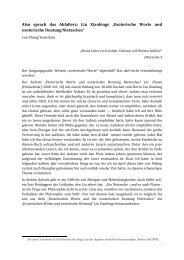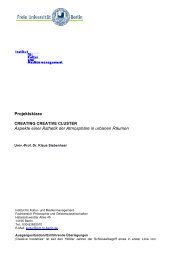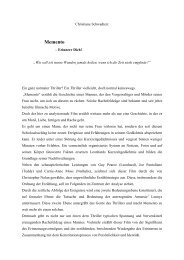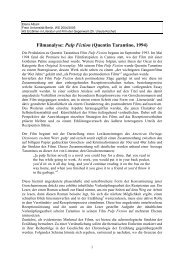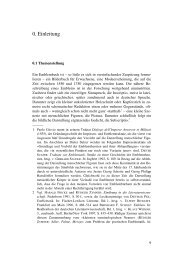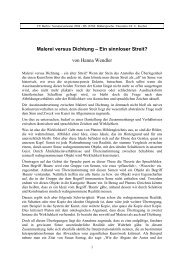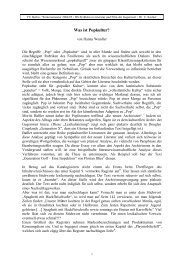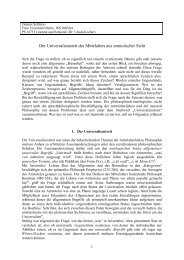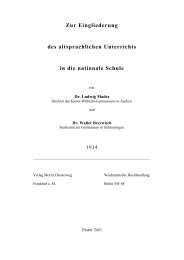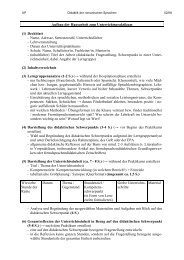nominalizations of french psychological verbs - Fachbereich ...
nominalizations of french psychological verbs - Fachbereich ...
nominalizations of french psychological verbs - Fachbereich ...
Create successful ePaper yourself
Turn your PDF publications into a flip-book with our unique Google optimized e-Paper software.
240<br />
JUDITH MEINSCHAEFFER<br />
<strong>of</strong> the experience, as in (10a), but not to the experiencing entity, (10b). With<br />
(most) EO-<strong>verbs</strong>, they can realize neither participant, (10c) and (10d). 2<br />
(10) a. l’admiration du lecteur pour ce livre<br />
“the admiration <strong>of</strong> the reader for this book”<br />
b. #l’admiration de ce livre pour le lecteur<br />
“the admiration <strong>of</strong> this book for the reader”<br />
c. #l’amusement des enfants pour ce jeu<br />
“the amusement <strong>of</strong> the children for this play”<br />
d. #l’amusement de ce jeu pour les enfants<br />
“the amusement <strong>of</strong> this play for the children”<br />
Pour-phrases are also found with non-deverbal <strong>psychological</strong> nominals; they<br />
likewise refer to the target or cause <strong>of</strong> the experience, but not to the experiencing<br />
entity, see (11).<br />
(11) a. Nicolas s’intéresse aux détails.<br />
“Nicolas is interested in the details.”<br />
b. #l’intérêt pour Nicolas<br />
“the interest for Nicolas”<br />
c. l’intérêt pour les détails<br />
“the interest for the details”<br />
Interestingly, de-phrases do not show the same distribution with respect to<br />
all classes <strong>of</strong> <strong>psychological</strong> <strong>nominalizations</strong>, as exemplified by (1) and (2) above.<br />
De-phrase complements <strong>of</strong> ES-<strong>nominalizations</strong> can realize either the experiencing<br />
entity, as in (7b) above, or the target or cause <strong>of</strong> the experience, (7c) above. The<br />
same is true for de-phrase complements <strong>of</strong> some EO-<strong>nominalizations</strong>, like<br />
fascination. In (12b), the de-phrase refers to the experiencing entity; in (12c), it<br />
refers to the target or cause <strong>of</strong> the experience.<br />
(12) a. L’orateur a fasciné l’auditoire.<br />
“The speaker fascinated the audience.”<br />
b. La fascination de l’auditoire était facile.<br />
“The fascination <strong>of</strong> the audience was easy.”<br />
c. La fascination de l’orateur m’a surpris.<br />
“The fascination <strong>of</strong> the speaker surprised me.”<br />
2 Still, one does find phrases like la fascination de ce livre pour les lecteurs contemporains “the<br />
fascination <strong>of</strong> this book for contemporary readers”. Examples <strong>of</strong> this type are discussed in section 6.



